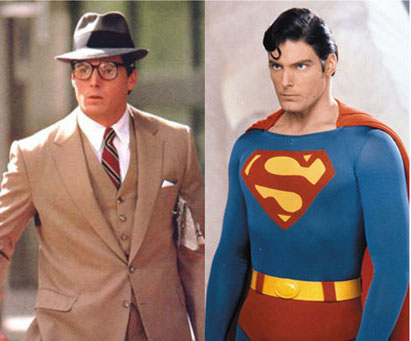(Guest post by Asher Johnson, M. A.)
Ever since I was a child, I was strangely attracted to the way the good guys thought. I saw them as smart, self-controlled, kind, patient, and wise. I thought it was naturally harder to do the right thing, and found it fascinating how easily taken for granted heroes were. Now, to put things in perspective, I will need to age myself because the good guys I grew up watching are, in many ways, unlike the anti-heroes of today (e.g. Jax from Sons of Anarchy, Nurse Jackie, Walter White, Tony Soprano, or Kevin Spacey’s brilliant role as Francis Underwood).
I grew up in the glorious days of watching Star Wars Episodes IV-VI, the animated films The Hobbit and Lord of the Rings, Linda Carter as Wonder Woman, Bill Bixby and Lou Ferrigno as David Banner and Hulk, re-runs of the 1960’s TV series of Tarzan played by Ron Ely, Lindsey Wagner as The Bionic Woman, Lee Majors as the Six Million Dollar Man, the first four Rocky movies, and, of course, Christopher Reeve as Kal-El, Superman, and Clark Kent. Looking back on my childhood television-viewing habits, I now realize where I learned the various coping skills to bear with the hardships I was enduring then, and to provide me with a buffer against caving into anger the way Bruce Wayne did, how to overcome the same feelings of entitlement and hatred that succumbed Anakin Skywalker later turning him into Darth Vader, and how to try to be understanding of others’ weaknesses, much like Gandalf is.
I learned from Yoda that with wisdom comes humor and acceptance, and anti-bullying problem-solving techniques from Spiderman and Hulk. Most importantly, I witnessed that heroes typically walk a lonely road, frequently having to choose their values over their immediate desires to be accepted and recognized for who they are. While I would never hope to think I’ve actually lived up to the superheroic standard, I can say that my sense of self internalized superheroic values. The characters made their archetypal mark within my personality development, resulting with me setting my standards to a height probably more idealistic than realistic, thereby never allowing me to give up hope, even in times when the darkness is thick enough to swallow any flicker of light.
Not long ago, a client I had been working with at a crisis house called me Clark Kent, just out of the blue. His exact words were, “Alright then, Clark Kent, you’re good people.” Shortly before that, one of colleagues, half-jokingly, half seriously, described me as the following: “Asher’s kind of like Clark Kent. He puts on a show of being helpless and needy, but then he suddenly swoops in like Superman, saves the day and earns all the applause, just to get back into Clark Kent mode and act like nothing even happened.”

I’ll be honest and say that I was initially offended at being referred to as Clark Kent. First of all, I grew up with a strong affinity for Superman. He is difficult to manipulate, practically invulnerable, super strong, flies, sees and hears everything, savvy and ingenious, kind, exercises self-control, polite, and overall super good. People admire him, depend on him, and trust him at his word. While I can understand that he may be a difficult character for most people to relate, I’ve heralded him as one of my moral compasses to remind me of where my True North is at all times.
Clark Kent, on the other hand, is a misfit, clumsy, lacks confidence, disrespected and underappreciated, mocked, misunderstood, alienated, the water boy, ignored, and pretty much a nobody. Had he not been a humble man, he would be a perfect candidate for an excellent villain. Dousing my flame of narcissism with water in the form of reminding myself that it’s not about me, I was able to see Clark for what he is to Superman, rather than the feelings I have toward him—and to my amazement, I discovered the man is a hero. I believe that our connections with different superheroes can tell us a lot about ourselves, and so I decided to move past my bruised ego by being compared to Clark Kent, and instead take a closer look at his character.
First of all, Clark Kent is really Kal-El’s humanity. Kal-El is an orphaned alien, sent to earth as a pilgrim of hope for his own race while inadvertently offering hope to the human race. Clark Kent would be more of the Jesus Christ in the religious perspective—the physio-spiritual bridge between God and humanity and the walking sacrifice or ultimate symbol of compassion. Typically, Superman is compared to Jesus, but Jesus was ridiculed and treated as though he was inferior, aside from the few who knew he was. Jesus frequently hid in plain sight, like Clark Kent. Jesus was the walking example of humility, never taking credit for any of the amazing miracles he did. The same goes with Clark Kent. He chose to lower himself, as his way to be approachable. Clark Kent has the ability to fry someone with one look and turn them into a piece of Popeye’s chicken if he wants to, but he chooses to remain submissive, yielding to his role, because he realizes his purpose is far greater than his need for validation.

This leads to my second point. Clark Kent is the Yin to Superman’s Yang. Yin keeps Yang from rising too high, while Yang keeps Yin from sinking too low. Without Clark, Superman would likely be of no use to us. He would not know what it feels like to suffer emotionally. He cannot be controlled by humans, thus, it is his sense of humanity that holds him in check. As depicted in Superman III, Clark and Superman have a battle, after Superman was exposed to what might have been the equivalent to either black Kryptonite (to split his personality) or red Kryptonite (to make him act in bizarre ways).
Thirdly, Clark carries the source of internal strength and flexibility, where Superman must frequently tap into, in order for him to defeat Supervillains. Superman is used to feeling invincible, rendering him vulnerable to apathy or complacency when fighting his enemies. However, because of the struggles Clark faces, Superman has learned to persevere, use his mind and not only his strength to problem-solve, and communicate with his opponents as well as his allies when faced with challenging battles. Clark gives Superman the will to keep going and keep hoping. He reminds Superman how painful it is to be human, which keeps Superman compassionate to those who have been seduced by greed, envy, and fear.
Clark Kent is a compelling character because he chooses to put himself in a position in which he is lower than others around him. By doing so, he is underestimated by his peers, rendering them much more vulnerable than he is. This concept is nothing new, as Sun Tzu advises in the Art of War, “Pretend to be weak, that he [the enemy] may grow arrogant.”
The opposite of arrogance is humility. The Latin root word for humility—“hum” literally translates to “on the ground,” which means that when someone has a humble attitude, he or she assumes no more self-importance than others. Arrogance comes from a term describing someone who does self-assume greater importance. There is something earth shatteringly powerful about humility, particularly when the action is executed from a position of strength and will. Think about a time when you asserted your right to be “right” and the other graciously let you have that one because it just wasn’t worth it. I can think of many times I felt humiliated after exposure to another’s willing humility. I can also think of the times I felt empowered by executing my own humility. I was afforded the opportunity to watch the other’s eyes widen in surprise, fear, or shame (or any combination of feelings), as I was initially underestimated. The less humble I am, the less control I have over myself. While watching Superman during my formative years, I must have been paying closer attention to Clark Kent than I realized—not that I am Mr. Humble, but I think it to be the most important trait to have, particularly if you’re a hero.
So, there it is. Clark Kent is Superman’s hero. If you don’t believe me, then I challenge you to be Clark for just a day, and notice if you feel a little freer and empowered, and less diminutive and powerless.
Asher I. Johnson, M.A.
Twitter: @asherjohnson7


That was brilliant! Today I will be Clark Kent!
🙂
Awesome job!
Nice analysis. Breaking it down step by step was indeed appreciated and well stated. Awesome man!
Aww that was something I didn’t know I needed today. I’m having one of those days and I stumbled upon this while searching for a Superman/Clark Kent alter ego online I can draw. That was beautiful.